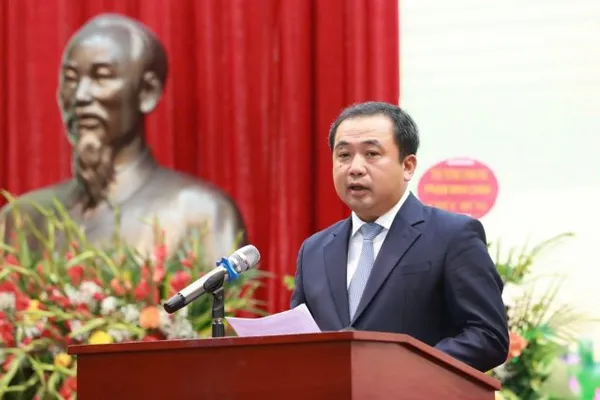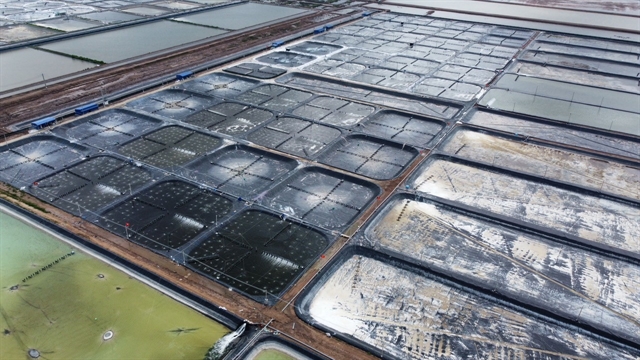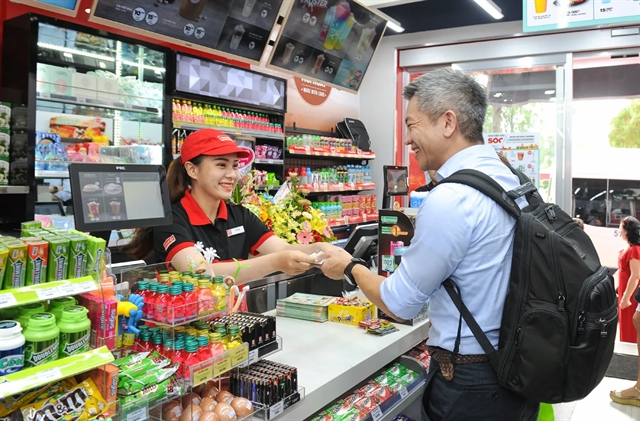 Economy
Economy
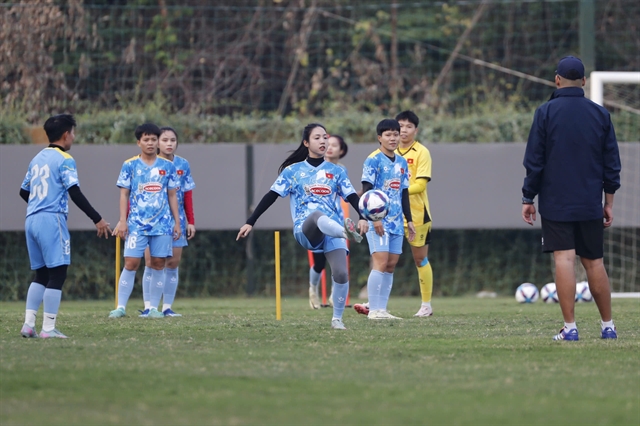
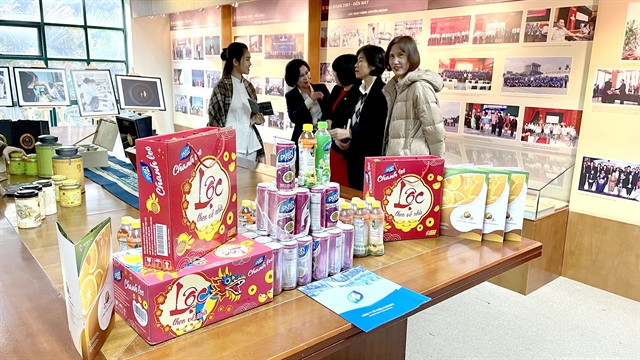 |
| Attendees at the Halal product showcase during the symposium. — VNS Photo Mai Hương |
HÀ NỘI — In a bid to awaken Việt Nam's dormant potential in the global Halal market, experts emphasised the crucial role of standards and certifications during a symposium held on Wednesday in Hà Nội.
Discussions focused on the importance of standardisation in boosting Việt Nam's sustainable participation in the global Halal market.
Hà Minh Hiệp, acting Director General of the Directorate for Standards, Metrology and Quality of Vietnam (STAMEQ) said the Vietnamese government, recognising the significance of the Halal market, aims to integrate into the economies of Muslim-majority nations.
On February 14, 2023, the Vietnamese Prime Minister issued the initiative "Enhancing International Cooperation to Build and Develop Vietnam's Halal Industry by 2030". Institutions like STAMEQ and Vietnam Certification Centre (QUACERT) are actively developing Halal standards for Việt Nam, collaborating with international partners, notably Malaysia, to ensure global recognition of Halal certifications issued by Vietnamese authorities. This recognition is pivotal for domestic manufacturers and exporters seeking to tap into the burgeoning global Halal market.
Halal certification, a voluntary system, assures Muslim consumers that a product or service meets halal standards. Independent bodies inspect, audit and verify sources, ingredients, processes, and facilities. This certification also includes labeling and marketing with a recognisable halal logo or symbol.
The Halal market is viewed as a potential goldmine for Việt Nam's burgeoning Halal industry. With over 1.9 billion Muslims globally, the Halal economy is predicted to reach US$5 trillion by 2030, according to research by Frost & Sullivan. In 2023 alone, the global Halal food market surged to $1.5 trillion, boasting a remarkable compound annual growth rate (CAGR) of 15.4 per cent. The projections estimate a growth trajectory to $2.58 trillion by 2027.
According to Professor Dr. Đinh Công Hoàng from the Institute of African and Middle Eastern Studies, Halal, denoting what is permissible in Islam, extends beyond just food and beverages. The Halal trend encompasses healthcare, cosmetics, tourism and fashion. This ethical and transparent movement is having substantial impacts on global consumer behaviour.
Leveraging Việt Nam's geographical proximity to Halal markets, abundant Halal-friendly commodities, and active participation in pivotal regional economic networks, notably through engagement in new-generation free trade agreements, Hoàng believes Việt Nam can swiftly expand its exports in this overlooked market.
However, he also pointed out some challenges including limited awareness and understanding of Halal among the Vietnamese population and businesses, coupled with the complex and non-harmonised Halal certification process. The high costs associated with meeting global Halal supply chain standards, including specialised equipment and sourcing safe ingredients, also hinder Việt Nam's businesses.
Hoàng proposes the establishment of a comprehensive ecosystem covering production, services, logistics, finance, and infrastructure, including Halal industrial zones and research and development facilities. He also advocates for economic diplomacy with Muslim-majority countries, exploring free trade agreements (FTA) with potential Halal markets and leveraging regional agreements (AfCFTA, OIC, GCC).
Additionally, he recommends establishing a national Halal management agency, enhancing standardisation efforts, and fostering international cooperation.
Dato’s Tan Yang Thai, Malaysia's Ambassador to Việt Nam, acknowledges the challenge of understanding the Halal concept in a non-Muslim country like Việt Nam. He emphasised that the Halal industry, while rooted in religious practice, should also be viewed through a hygienic lens, aligning with the "halalan-toyibban" practice for wholesome and safe products.
“For Malaysia, halal cooperation is one of the significant areas of collaboration and in line with the Plan of Action under Malaysia-Việt Nam Strategic Partnership thus we are ready to support and render our assistance to the Vietnamese businesses or officials in developing the halal industry here,” the Malaysian ambassador said.
To facilitate businesses in accessing precise information on market-specific Halal standards and certification requirements, STAMEQ will soon establish the National Halal Certification Centre. This official agency will provide certification services, offer training on Halal standards for Vietnamese organisations, and engage in international cooperation activities in the Halal sector.
Furthermore, this authority under the Ministry of Science and Technology is actively researching and refining a set of national Halal standards in alignment with international and regional regulations. This standardised system aims to empower Vietnamese businesses by providing information on regulatory requirements for Halal markets and products.
Việt Nam has already issued five national TCVN standards in the Halal field, encompassing general requirements, good agricultural practices, animal feed, food processing, and conformity assessment. These standards harmonise with globally recognised benchmarks, including CODEX CXG 24-1997, Malaysian Standard MS 1500:2019, GSO 2215:2012, and UAE.S 2055 -1:2015.
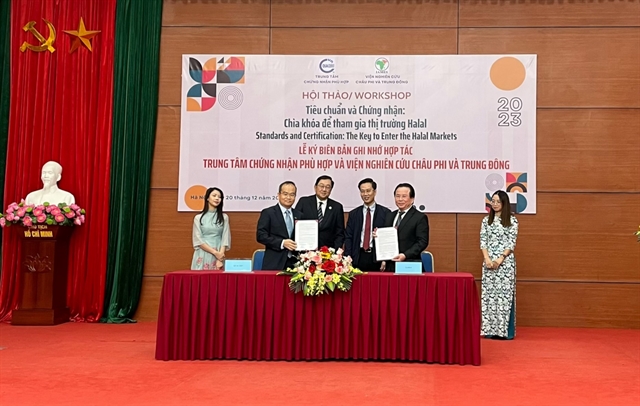 |
| At the signing ceremony. — VNS Photo Mai Hương |
The symposim also witnessed the signing of a Memorandum of Understanding between QUACERT and the Institute of African and Middle Eastern Studies. This agreement aims to foster knowledge development, standard creation, and certification services, fostering international cooperation on Halal. The collaboration spans strategic research, national quality infrastructure development, knowledge dissemination, training, conferences, seminars, market connection programs, and international cooperation initiatives in the Halal industry. — VNS

